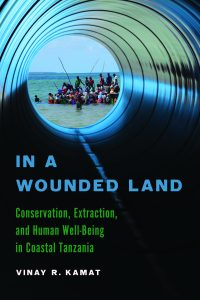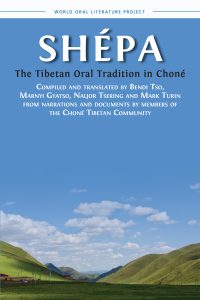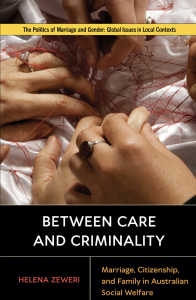Join us for a collective book launch celebrating the new books by Dr. Vinay Kamat, Dr. Mark Turin, Dr. Maya Wind, and Dr. Helena Zeweri.
The event will include short talk with the authors and some light refreshments. Copies of the books will be on site.


In a Wounded Land: Conservation, Extraction, and Human Well-Being in Coastal Tanzania
by Vinay R. Kamat
Focusing on the human element of marine conservation and the extractive industry in Tanzania, this volume illuminates what happens when impoverished people living in underdeveloped regions of Africa are suddenly subjected to state-directed conservation and natural resource extraction projects, implemented in their landscapes of subsistence. In a Wounded Land draws on ethnographically rich case studies and vignettes collected over ten years in several coastal villages on Tanzania’s southeastern border with Mozambique. In seven chapters, the book demonstrates how state power, processes of displacement and dispossession, forms of local resistance and acquiescence, environmental and social justice, and human well-being become interconnected. Written in lucid, accessible language, this is the first book that reveals the social implications of the co-presence of a marine park and a gas project at a time when internationally funded conservation initiatives and extraction projects among rural African populations are engendering rapid social transformation.


by Mark Turin, Bendi Tso, Marnyi Gyatso, Naljor Tsering and members of the Choné Tibetan Community
This book contains a unique collection of Tibetan oral narrations and songs known as Shépa, as these have been performed, recorded and shared between generations of Choné Tibetans from Amdo living in the eastern Tibetan Plateau. Presented in trilingual format — in Tibetan, Chinese and English — the book reflects a sustained collaboration with and between members of the local community, including narrators, monks, and scholars, calling attention to the diversity inherent in all oral traditions, and the mutability of Shépa in particular.


by Maya Wind
Israeli universities have long enjoyed a reputation as liberal bastions of freedom and democracy. Drawing on extensive research and making Hebrew sources accessible to the international community, Maya Wind shatters this myth and documents how Israeli universities are directly complicit in the violation of Palestinian rights.
As this book shows, Israeli universities serve as pillars of Israel’s system of oppression against Palestinians. Academic disciplines, degree programs, campus infrastructure, and research laboratories all service Israeli occupation and apartheid, while universities violate the rights of Palestinians to education, stifle critical scholarship, and violently repress student dissent. Towers of Ivory and Steel is a powerful expose of Israeli academia’s ongoing and active complicity in Israel’s settler-colonial project.
Between Care and Criminality:

by Helena Zeweri
Between Care and Criminality examines social welfare’s encounter with migration and marriage in a period of intensified border control in Melbourne, Australia. It offers an in-depth ethnographic account of the effort to prevent forced marriage in the aftermath of a 2013 law that criminalized the practice. Disproportionately targeted toward Muslim migrant communities, prevention efforts were tasked with making the family relations and marital practices of migrants objects of policy knowledge in the name of care and community empowerment. Through tracing the everyday ways that direct service providers, police, and advocates learned to identify imminent marriages and at-risk individuals, this book reveals how the domain of social welfare becomes the new frontier where the settler colonial state judges good citizenship. In doing so, it invites social welfare to reflect on how migrant conceptions of familial care, personhood, and mutual obligation become structured by the violence of displacement, borders, and conditional citizenship.
